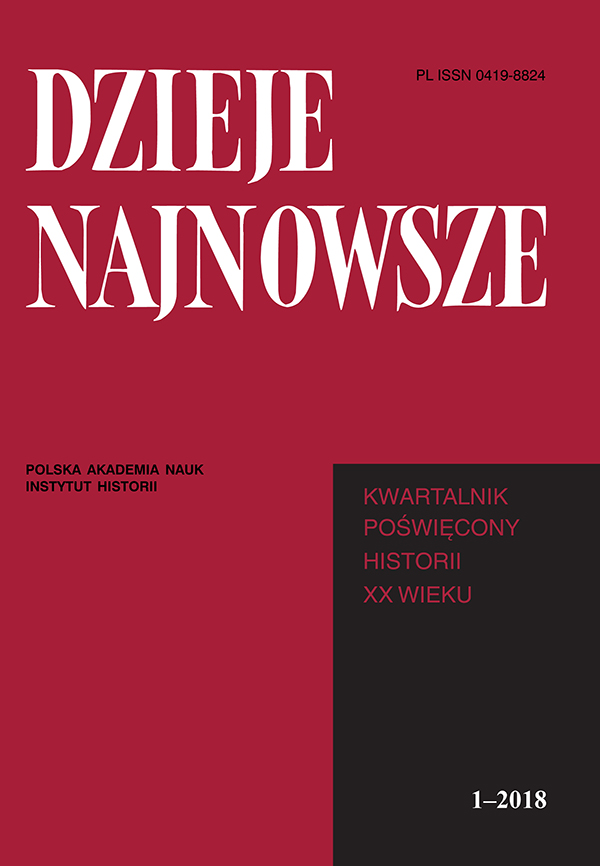„Marzy mi się Lew Boży”. Kryzys ustrojowy w Pakistanie 1953–1955
DOI :
https://doi.org/10.12775/DN.2018.1.08Mots-clés
Pakistan, system westminsterski, Hans Kelsen, Westminster systemRésumé
Artykuł omawia przesilenie ustrojowe w Pakistanie, które trwało w latach 1953– 1955 i zakończyło się praktyczną likwidacją ustroju demokratycznego w tym państwie. Władza wykonawcza (gubernator generalny) w sojuszu z sądowniczą (Sąd Najwyższy) i wojskiem odrzuciła przejęte po Brytyjczykach niepisane zasady regulujące parlamentaryzm, a w końcu rozpędziła i sam parlament. W ostatecznym rozrachunku droga ta powiodła kraj ku autokracji.
The article describes the crisis of Pakistani policy between 1953 and 1955, which resulted de facto in the liquidation of democracy. The executive power (Governor-General) allied with the judicial one (Supreme Court) and the army to get rid of the unwritten principles, taken over from the British, regulating the parliamentary order, and finally dissolved the Parliament itself. Ultimately, it led the country to autocracy.
Références
Ayub Khan M., Friends not Masters. A Political Autobiography, London 1967.
Baluch M.A.Y.K., Inside Baluchistan. A Political Autobiography of His Highness Baiglar Baigi, Khan-e-Azam-XIII, Karachi 1975.
Binder L., Religion and Politics in Pakistan, Berkeley 1963.
Chief Justice Muhammad Munir. His Life, Writing and Judgments, ed. N.C. Chaudhry, Lahore 1973.
Constitution-Maker. Selected Writings of Sir Ivor Jennings, ed. H. Kumarasingham, Cambridge 2014.
Diaries of Field Marshal Mohammad Ayub Khan, 1966–1972, ed. C. Baxter, Karachi 2007.
Dil A., Dil A., Bengali Language Movement and the Creation of Bangladesh, Dhaka 2011.
Fakhr-ul-Islam, Iqbal M., Islamizing the Constitution of Pakistan: The Role of Maulana Maudoodi, „Al-Idah”, XII 2013, no. 27.
Goodnow H.F., The Civil Service of Pakistan. Bureaucracy in a new nation, London 1964.
Hamid Khan, Constitutional and Political History of Pakistan, Oxford 2005.
Hamidul Huq Chowdhury, Memoirs. Autobiography, Dhaka 1989.
Hatch-Barnwell S., The Last Guardian. Memoirs of Hatch-Barnwell, ICS of Bengal, Dhaka 2011.
Ispahani F., Purifying the Land of the Pure. A History of Pakistan’s Religious Minorities, New York 2017.
Jalal A., The State of Martial Rule. The Origins of Pakistan’s Political Economy of Defence, Lahore 1991.
Kamal A., State against the Nation. The Decline of the Muslim League in Pre-independence Bangladesh, 1947–54, Dhaka 2009.
Karim S., Secular Jinnah & Pakistan. What The Nation Doesn’t Know, Karachi 2010.
Kiran N., The Federal Cabinet of Pakistan and Politics of East Bengal/Pakistan, 1947–1958, „IOSR Journal of Humanities and Social Science”, VIII 2016, vol. XXI, no. 8.
Kundi M.A., Ghulam Mohammad: His Life & Work, „Journal of Political Studies” 2016, vol. XXIII, no. 2.
Kux D., The United States and Pakistan, 1947–2000. Disenchanted Allies, Washington 2001.
Lombardi C., Islamism as a Response to Emergency Rule in Pakistan: the Surprising Proposal of Justice A.R. Cornelius, w: Emergency Powers in Asia. Exploring the Limits of Legality, ed. V.V. Ramraj, A.K. Thiruvengandam, Cambridge 2010, s. 436–465.
McGrath A., The Destruction of Pakistan’s Democracy, Karachi–Oxford 1998.
McIntosh S.C.R., Kelsen in the „Grenada Courts”. Essays on Revolutionary Legality, Kingston 2008.
Memoirs of Huseyn Shaheed Suhrawardy with a Brief Account of His Life and Work, ed. M.H.R. Talukdar, Karachi 2009.
Müller J.W., Przeciw demokracji. Idee polityczne XX wieku w Europie, tłum. J. Majmurek, Warszawa 2016.
Munir M., From Jinnah to Zia, New Delhi 1980.
Newberg P., Judging the State. Courts and Constitutional Politics in Pakistan, Cambridge 2002.
Niaz I., Jinnah on governance: The unheeded advice of Pakistan’s Quaid-i-Azam, „Asian Affairs” 2016, vol. XLVII, no. 3.
Nikolić Z., Baker R.B., Between Politics and Science: The Dilemma of Reason, „The Journal Jurisprudence” 2014, vol. XXII.
Pirzada S.S., Dissolution of Constituent Assembly of Pakistan and the Legal Battles of Moulvi Tamizuddin Khan, Karachi 1995.
Qasmi A.U., The Ahmadis and the Politics of Religious Exclusion in Pakistan, London–New York 2014.
Riaz Ahmad, Pakistan’s First Constituent Assembly’s Efforts for the Making of Constitution, 1947–1954, „Pakistan Journal of History & Culture” 2002, vol. XXIII, no. 1.
Rizvi H.A., The Military and Politics in Pakistan 1947–86, Lahore 1987.
Seyyed Vali Reza Nasr, The Vanguard of the Islamic Revolution. The Jama’at-i Islami of Pakistan, Berkeley 1994.
Sheikh Mujibur Rahman, The Unfinished Memoirs, transl. F. Alam, Dhaka 2012.
Syed Sami Ahmad, Tamizuddin Khan’s Case. The Judgment that Brought Disaster, Karachi 1991.
Tamizuddin Khan, The Test of Time. My Life and Days, Dhaka 1989.
Zaheer H., The Times and Trial of the Rawalpindi Conspiracy 1951. The First Coup Attempt in Pakistan, Karachi 1998.
Téléchargements
Publiée
Comment citer
Numéro
Rubrique
Stats
Number of views and downloads: 464
Number of citations: 0



